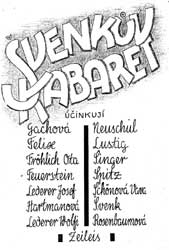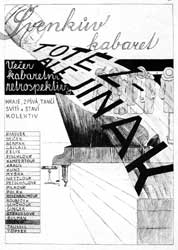Czech Theater in Terezin w Posters w Drama w Stage Design w Musicw Revues and Cabarets w Titbits about Schwenk w Puppet Theatre w Performances for Children w Home
Frantishek Zelenka, Sketches to The "Last Bicyclist", 1943
|
TITBITS
ABOUT SCHWENK |
|
The Last Bicyclist I remember the
beginning: 'Everyone who has been a pedestrian for four generations, is no
longer bicyclist. Bicyclists are enemies. They should be erased from the face
of the earth.' Especially, it concerned smart Jews, such as Abeles Bozhivoj. Such types never
fight. In Terezin, revolt would be ridiculous. Everybody had faith for
possible survival, God knows where they found it. Bozhivoj fell in love with Manichka. She asked him to present her
a bicycle. This innocent request triggered the whole chain of events. Bozhivoj the bicyclist was arrested
and exiled to the Miss Crazy, the dictator, realizes that if
all bicycle riders are destroyed, she would have nobody to blame for all bad
things happening in the state. So she decides to put the last bicyclist in a
cage and show him to the citizens as the root of all evil and the inciter of
unrest. There was another excellent
scene: Abeles finds a professor who
transforms bicycle riders into pedestrians. I remember one blonde with
typically bicyclist nature being turned into an ordinary foot-passenger. Finally, the last
bicyclist Bozhivoj has to be flown
to the Moon. He bids farewell to Manichka.
Miss Crazy inspects the rocket. Abeles lights a cigarette — his last
wish. From the match, the rocket is launched and carries miss Crazy and all her suite to the Moon, and Bozhivoj remains
with his Manichka. At the end, the
first notes of International were played. We sang and then the melody abruptly
stopped. Everybody became silent. I was made an Aryian Frau. I had a wig with light
brown hair. I sang very badly. 'What a pleasant view on this God's world. Oh,
the mountains are blue and the valleys are green, tra-ta-ta-ta.' Jana
Schedova, actress, Prague Schwenk read us The Last Bicyclist. The Council of
Elders banned the play — the implication was too obvious. But the play was
read in the rooms. Sometimes, Karel did it himself, sometimes his friends
did. In our room, for example, it was Otto Toepfer. Clearly, the rooms were
too small to collect an audience the performances usually did. I remember
that after the Bicyclist was banned, Schwenk started another play, a
situation comedy, nothing serious... Hana Malka (Fialova), |
|
|
Long Live Life! The show featuring the
song that became ghetto anthem was premiered early in '43 and shown 20 times.
The plot was very simple. A Capitalist solemnly dedicates a statue to the
Unknown Worker. The Statue is so ashamed of the hypocritical speech that it
flees from the podium. It hides among people and tries to live as them, but
soon sees how empty their life is. Disillusioned, the Statue returns to its podium. In the performance Cajlais, the Capitalist, wore tailcoat and
cylinder. He had animal masks; addressing people at the Monument opening, he
said: 'Dear cows and buffalos'—and changed the masks. Karel, the Statue, wore
blue overalls. E.M. |
The Broken Harmonium In Terezin, Schwenk
found an old broken harmonium. He had it repaired, and it stood in his little
room. I remember, he had a huge volume in Gothic German, something about Niebelungs. Karel put it on a music
stand instead of the notes, and improvised. He liked to play around some
simple melody, as if it was played by Mozart or Beethoven. …Do you know how
Schwenk went to the transport? He took a book by Brothers Grimm with him and
told us: 'Finally, I'll have time to study German!' Margit Silberfeld |
|
Schwenk's Last Days In Terezin I think I was the last
one who stayed with Cajlais and Schwenk. Cajlais had a love, a medical nurse,
and she didn't come to say goodbye. Cajlais was very depressed. Schwenk tried
to persuade him, perhaps something happened in the hospital and she couldn't
make it. Karel was also very quiet and sad. I remember him saying to me that
he was fit for nothing, that everything was lost, that he deceived everybody
when he sang 'we shall laugh on the ruins of the ghetto'… We went to walk to the
ramparts. It was after Otto had left. There were parallel bars. Schwenk made
exercises, raised himself on his hands. 'This I'll take for my new piece', he
said. He still had hope in his heart.
Hana Malka (Fialova) |
|
|
|
The Last Show I was with Karel
Schwenk in Meuselwitz. Many had only rags on their feet. Nobody had warm
clothes for protection from the piercing cold. And we were working with steel
sheets… We collected bread as much as we could, and persuaded Schwenk to
sing… 'Everything is possible, if you want it very much. We can hold each
other's hands and laugh on the ruins of the ghetto. Only man is given
immortality…' Schwenk was waning
before our eyes. It was his last entrance. His song meant more to us than
bread. Arnost Lustig, writer, Washington |

